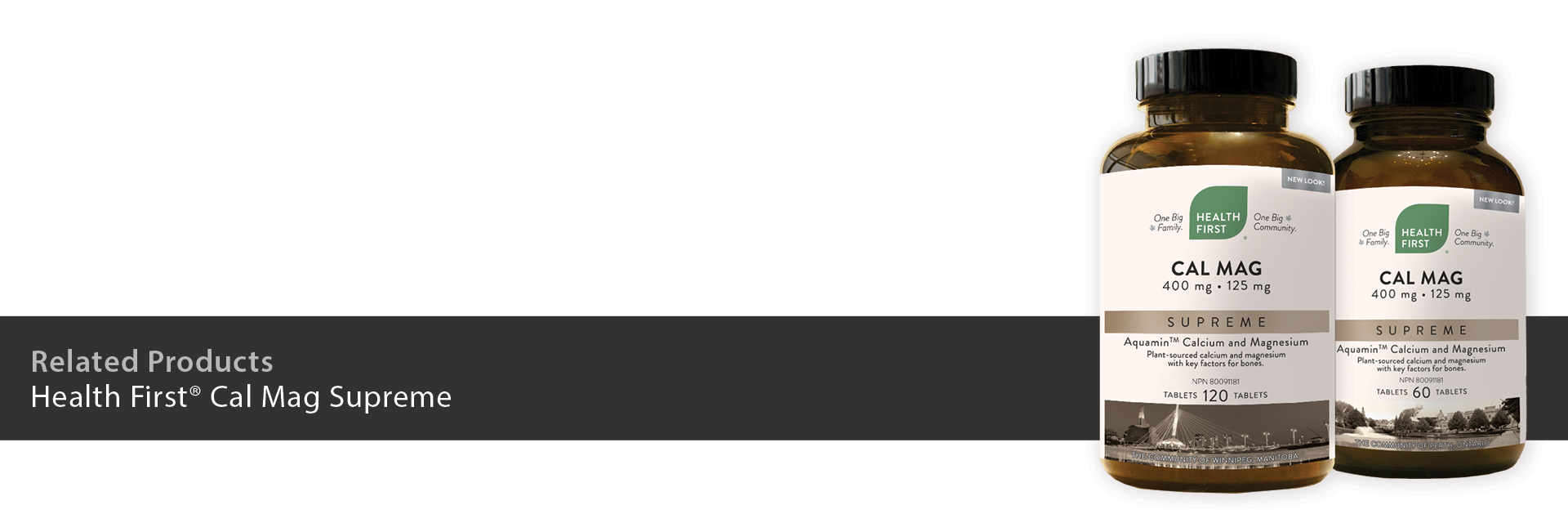

Looking for Plant-Based Calcium?
Most calcium supplements on the market are derived from mined limestone. As we don’t often sit down for a hearty meal of rocks, supplementing with a more “food-like” source makes sense. The algae Lithothamnion calcareum is such a source – a living, edible plant rich in calcium and other nutrients. Branded as Aquamin™, it is a red algae that grows off the coast of Iceland that naturally contains over 30% elemental calcium. The majority of limestone-derived calcium supplements are just that – calcium. Aquamin™, being a whole food also contains a complement of minerals such as magnesium, potassium, phosphorus and the trace minerals boron, strontium, vanadium, copper, silica, selenium and zinc, all of which are involved in bone health.
Originally used in Ireland as a natural fertilizer, its tremendous effects on livestock health led Lithothamnion calcareum to be investigated for human health applications. Initial anecdotal reports on the algae’s benefits for arthritic conditions led to more in-depth studies. Many clinical studies later, Aquamin™, the branded version of Lithothamnion calcareum was born.
Aquamin™ is sustainably harvested under a controlled 30-year license by the Icelandic government. Independent monitoring and continuous research are done to ensure harvest activities are not impacting the local ecosystem. Only the fully calcified algae are harvested, leaving young algae to grow to full maturity. The area of harvesting is strictly controlled to ensure the material is sustainably harvested and is monitored by GPS systems and divers.
Aquamin™ has several clinical studies, showing safety, absorbability and effectiveness for bone health:
- Aquamin™ has been shown to reduce levels of PTH (parathyroid hormone) in the body more effectively than other forms of calcium. PTH reduces calcium content in the bones by making it available to the rest of the body. High levels of PTH are associated with calcium leeching from the bones and reduced levels of bone mineral density, which can lead to osteoporosis. Aquamin™ has shown this positive effect in pre and post-menopausal women and athletes in non-impact sports (i.e. cycling) who exhibit lower-than-normal bone mineral density.1,2,3
- In studies of bone cells, Aquamin™ has been shown to effectively remineralize the cells. By remineralizing the cells, the number of osteoblasts are increased. Osteoblasts are responsible for new bone formation. Researchers theorized that the synergistic effect of the mineral complex in Aquamin™ was responsible for the increase in osteogenesis (bone formation activity). 4
- Aquamin™ has been shown to have anti-inflammatory properties that help to reduce joint pain and stiffness. In fact, one clinical study showed Aquamin™ to be as effective at reducing joint pain as glucosamine sulfate and better at reducing joint stiffness! 5,6
Aquamin™ calcium comes from a “whole food” source with over 74 trace minerals allowing it to be easily absorbed by the body. The clinical studies and sustainability of Aquamin™ should make it clear that it’s time to rethink the way you supplement your calcium.
References:
1. Osteoporosis Canada. www.osteoporosis.ca
2. Hope, Jenny. Calcium pills taken by hundreds of thousands of women ‘double risk of heart attack and could do more harm than good’. May 22, 2012, Daily Mail. http://www.dailymail.co.uk/news/article-2149031/Calcium-booster-pills-raiserisk-heart-attack-harmgood.html#ixzz21nlFlR5S
3. M. J. Bolland, A. Grey, A. Avenell, G. D. Gamble, I. R. Reid. Calcium supplements with or without vitamin D and risk of cardiovascular events: reanalysis of the Women’s Health Initiative limited access dataset and meta-analysis. BMJ, 2011; 342 (apr19 1): d2040 DOI
4. A double-blind placebo-controlled parallel group study in post-menopausal women to assess the effect of calcium supplementation on markers of bone resorption. Shandon Clinic, Cork, Ireland.
5. Frestedt JL, Kuskowski MA, Zenk JL. A single dose pharmacokinetic and pharmacodynamics comparison of two calcium supplements in pre-menopausal women. Minnesota Applied Research Centre, Minnesota, USA
6. Barry, D. W., K. C. Hansen, R. E. Van Pelt, M. Witten, P. Wolfe, and W. M. Korht. Acute Calcium Ingestion Attenuates. Exercise-Induced Disruption of Calcium Homeostasis. Med. Sci. Sports Exerc., Vol. 43, No. 4, pp. 617–623, 2011.

